Giving a patient medications in the ER, having them pop positive on a test, and then withholding further medications because…
Monday Morning Update 10/29/12
From The PACS Designer: “Re: iPod’s 11th anniversary on November 10. The four versions of iPod are Shuffle, Nano, Classic, and Touch. While primarily a storage device for music, they can be used as a storage device for other data elements. Can there be a use in healthcare for the iPod? Let’s have some discussion on the subject.” My Touch is like an iPhone without the calling capability provided you’re in WiFi range, so I would say yes. You would think that a hospital might look at the Touch as a pager replacement for nurses for in-hospital use – it’s cheap and portable, it doesn’t require a cell contract since it works on WiFi, it comes with a camera and Facetime, and it runs most iPhone apps.
From Fertile Imagination: “Re: clinical raffles. I’m speechless that providers would turn this into a contest.” A New York in vitro fertilization clinic runs a contest offering IVF free services to contestants who submit the winning emotional or entertaining essay or video explaining why they deserve the prize. One winner was notified on the day after Labor Day in a scene worthy of a Publisher’s Clearing House commercial: a doctor carrying balloons knocked on her door. Another winner earned her prize by running in a 5K race, where each registration came with one raffle entry. CDC says 1 percent of American-born babies are conceived by IVF. A Harvard Medical School ethics professor concludes, “I think it’s a good parody of the unfair system in which important medical services are only available to those who can afford them. Nevertheless, sometimes these raffles exploit the despair of couples or their misunderstanding of statistics to extract money from them.”
From HITEsq: “Re: Craneware. Being sued by the American Hospital Association for copyright infringement regarding its unlicensed use of the UB-04 codes. My personal take: none of these codes, as codes, should be the subject of copyright, especially when they are used only for functional purposes for which they were created which the AHA helpfully explains in paragraph 7. What’s more, they go on about all the work in maintaining them. Of course, in copyright law, ‘sweat of brow’ does not make something copyrightable.”
Listening: Real Estate, gentle and summery pop music featuring jangly, liquid guitars with a lot of nice vocals and instrumental work hiding behind the obvious hooks so that you can play it repeatedly without getting tired of it.
Only one survey respondent reported that his or her PCP uses Twitter for medical purposes. New poll to your right, for providers: which sources do you find valuable when evaluating vendors? Feel free to choose more than one or check “none” of you don’t find any of them useful. Your comments are welcome as well – after you vote, you’ll see a Comments link.
I’m healthy and fortunately get few chances to evaluate healthcare IT as a patient, but my annual physical last week provided an opportunity. Thinking about it afterward, I was surprised at how many positive technology elements have crept in. I had changed my appointment online a couple of times using the practice’s online portal instead of wasting time on the telephone. I pre-paid my co-pay online and printed a barcoded itinerary. I scanned that paper at the kiosk when I arrived and didn’t need to wait in line since that checked me in. My doc pulled up the EMR screen after the usual chit-chat (the practice just switched to Epic a few months ago) and noticed my weight was the lowest in the seven years I’ve been going to him, so the EMR information allowed him to reinforce that behavior effectively. He did medication reconciliation and reviewed my history over the past year while we looked at the EMR’s screen together. My one and only maintenance med (hydrochlorothiazide, since I used to have high blood pressure) went out to the pharmacy by e-prescribing. I received an e-mail this weekend saying my lab results were available on the practice’s portal, where I could review them in printable PDF format along with a reassuring note from my doc (“Wow, these all look great!”) Also on the portal was a printable visit summary for future reference. We IT types may argue incessantly about the clinical value value of technology in care delivery, but as a patient, I’m sold on the convenience factor. Not to mention that my doctor knows exactly how to use technology to support the way he practices medicine instead of allowing it to dominate either the encounter or our relationship.
I don’t know of many hospitals that developed their own clinical systems, and the cost and torrid development pace required to keep up with Meaningful Use and changing care models have led most of those to cry uncle and replace their old stuff with commercial products. Vanderbilt is apparently hanging in there according to an article in the VUMC newsletter that says they’ve made some nursing documentation enhancements to StarChart/StarPanel, VUMC’s clinical data repository that holds electronic and scanned paper patient documentation. Vandy offsets some of the expense by licensing its creations to vendors: McKesson bought WizOrders (relabeled as the marginally successful but dying Horizon Expert Orders) and Informatics Corporation of America commercialized StarChart/StarPanel.
I’ve read several articles lately about the rapidly increasing cost of the bipartisan-supported, pseudo-socialist American government in which fewer and fewer workers subsidize those who aren’t contributing (either because they can’t or because they choose not to). I don’t always agree with George Will, but his editorial on disability payments mirrors what I’ve read elsewhere. Disability payments are now going to 8.6 million people, more than half of them claiming unprovable mood disorders or back pain. The ratio of workers to those receiving government disability checks has gone from 134:1 in 1960 to 16:1 today even as the number of physically strenuous jobs dropped significantly. The healthcare connection, according to George: “The radiating corruption of this entitlement involves the collaboration of doctors and health care professionals who certify dubious disability claims. The judicial system, too, is compromised in the process of setting disability standards that enable all this.” I’ll take a broader societal view: there’s no longer any shame or embarrassment involved in cashing the many forms of automated government checks that career politicians and indifferent bureaucrats dole out like vote-seeking lollipops, so the only thing standing between unmotivated or unprepared Americans and the government food trough is ever-dwindling personal responsibility. Check the federal deficit and entitlement spending if you want to see how that’s working for us.
Cerner shares jumped 13 percent on Friday following a good earnings report. The company said in the earnings call that its clients acquired 75 hospitals in the past 18 months, potentially expanding Cerner’s customer base with minimal effort required. They also predict an “acceleration in the displacement market” (i.e. replacements of Epic) over 5-7 years as organizations look at “the horse they bet on and make a decision to go in a different direction.” Neal Patterson dropped by at the end to say that Cerner has “reinstated a boldness around here” and declared the company to be “the most significant innovator in healthcare.”
The Detroit business paper says that Henry Ford Health System may be acquiring Beaumont Health System.
Mark Clark (Poudre Valley Health Care) is named CIO of Great Plains Regional Medical Center (NE).
Quality Systems (NextGen) announces Q2 results: revenue up 8 percent, EPS $0.26 vs. $0.35, missing consensus estimates on both. Shares closed Friday at $17.19, down 3 percent and now 60 percent off from their price in April. System sales revenue was down by 15 percent, but was partially offset by implementation revenue (warning sign: reduced sales now means less implementation revenue down the road). The usual obvious reactionary steps were announced: restructure the sales organization and consolidate development efforts (always begging the equally obvious question: if it’s such a good idea, why wasn’t it done before?) The hospital division sold to six new hospitals, but still lost money. The company will continue paying dividends to shareholders but won’t institute a share buy-back program, saying they would rather use the money to fund possible acquisitions of several companies they’re talking to (they hinted at revenue cycle, hospital products, and ACO-type service offerings). They also say that they expect many of the 462 Stage 1 EHR vendors to fail at achieving Stage 2, leading to a big replacement market. NextGen won’t issue guidance this fiscal year, citing rapidly changing market conditions and the proxy fight it recently endured.
Here’s the five-year Quality Systems share price vs. the Nasdaq in red. QSII was on a nice run, but all that’s been wiped out to the point that performance would have been just as good buying a Nasdaq index fund (“just as good” being relative – you would have done little better than break even either way).
CPSI’s Q3 numbers: revenue up 8 percent, EPS $0.63 vs. $0.54.
A Senate investigation finds that medical device manufacturer Medtronic paid millions to surgeons who put their name as authors on journal articles that were actually written by the company’s marketing team. Medtronic paid $210 million to doctors over 15 years related to its Infuse spine surgery product, including $34 million to University of Wisconsin orthopedic surgeon Thomas Zdeblick (who is himself the editor of a medical journal, Journal of Spinal Disorders & Techniques). Medtronic hired Yale University to review Infuse and his comments don’t sound nearly as pro-Medtronic as the allegedly shilled articles: “This sounds eerily familiar to many of the transgressions we’ve read about from the pharmaceutical industry. It paints a picture of a company very heavily involved in the science; marketing contaminating the science; and the medical profession and researchers being complicit. It’s no wonder the public has lost confidence in the drug and device industries.” My question, as always: Medtronic’s annual sales are $16 billion and its market cap is $42 billion, so how big of a fine would be needed to send a clear message if indeed they’re guilty? I’m thinking $5 billion and some jail time for the scumbag executives who were involved, but that’s just me. And for that matter, why not hit some of those greedy docs with some mega-fines and maybe suspend their medical licenses for producing phony medical research? This business of Uncle Sam settling out of court with mega-corporations for a financial slap on the wrist needs to stop. Medtronic paid a measly $24 million a few months ago to get DOJ off its back over paying kickbacks to doctors and $85 million to settle shareholder suits claiming it made misleading statements about Infuse.
Another argument that paying providers for quality doesn’t really work: the rate of catheter-related infections didn’t go down when Medicare stopped paying for them. That’s great news if you’re a fan of well-intentioned incompetence.
eClinicalWorks held its user group meeting this past weekend at the Gaylord National Hotel and Convention Center in the DC area, with 4,500 attendees and keynote speakers Surgeon General Regina Benjamin, MD and former eCW customer National Coordinator Farzad Mostashari, MD (who used eClinicalWorks, Epic, and NextGen when he worked for NYC’s Department of Health).
Weird News Andy must be brewing over missing this sad story, sent over by a worthy competitor. A new student nurse in Brazil accidentally kills an 80-year-old woman by somehow hooking up her IV to a cup of coffee. She explained on national TV: “As they were next to each other, anyone can get confused. I injected the coffee and I put it in the wrong place."
The Florida office of HHS’s Office of Inspector General says that thieves are stealing claims data from companies that administer Medicare claims. Scammers prefer Medicare records because CMS has balked at the effort required to change its identifier from Social Security number like everybody else has done, which allows the thieves to file fraudulent tax returns and collect refunds since IRS, like CMS, pays first and ask questions later (or never). In other words, one federal agency’s electronic data is used to create another agency’s electronic data for larcenous purposes, like interoperability for crooks. Did you ever get the feeling that government is the only organization where the more technology it uses, the more vulnerable it becomes to fraud because of poor oversight?
Athenahealth is negotiating with Harvard University for the purchase of Arsenal on the Charles, an 11-building office campus and former US Army arsenal in Watertown, MA that includes athena’s headquarters. The company seeks 1 million square feet, while the Arsenal property, estimated to cost about $200 million, has 765,000 square feet.
Vince checks in from Europe with good news about John Sacco (founder of JS Data) and sad news about Ed Meehan (Keane/NTT Data). As always, if you have memories, photos, or ephemera from healthcare IT companies of old (from before 1990 or so, let’s say) then Vince would enjoy hearing from you, especially if you have e-mail addresses or phone numbers for some of the long-lost folks who ran them.
Contacts
Mr. H, Inga, Dr. Jayne, Dr. Gregg.
More news: HIStalk Practice, HIStalk Mobile.


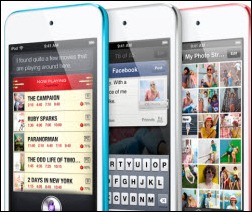

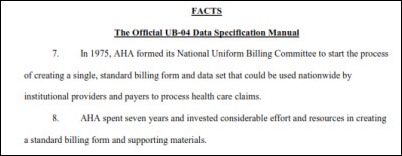
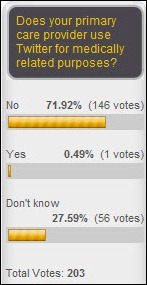
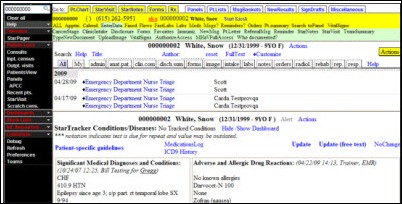



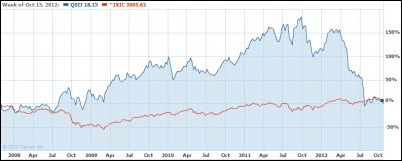

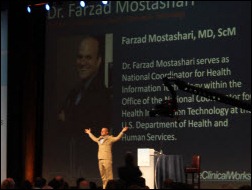

Re: iPod Touch. There are several reasons that iPod touches aren’t yet being used by nurses.
For one, there is no ear-piece for traditional phone communication.
The iPod may not have a phone ear piece, but AFAIK it has the capability to serve as a communication device with a VoIP app – it is Facetime ready, after all…
So you’re going to communicate PHI over speakerphone and FaceTime. Right.
Very sad news about the passing of Ed Meehan (Keane), a colleague and a friend.
May the road rise to meet you, Ed!
An interesting juxtaposition of George Will’s piece on disability payment “entitlements” and Medtronic’s Infuse (“entitlement?”) payments based on fraudulent research. This looks like medical fraud in both cases, but I doubt that George Will would write about Medtronic’s “entitlement” to CMS or private insurance payments or how much we all pay for that corporate level of medical fraud.
re: AHA suing Craneware. Wow. Who does the American HOSPITAL Association think is ultimately going to end up footing the bill for these new royalty payments? The hospitals themselves, of course. Way to represent your constituency, guys.
Add the AHA to the list of entities making healthcare needlessly more expensive.
Nice to see Vanderbilt still leading the charge as an innovative hospital IT shop. Mayo is still out there as well. It’s sad to see the other academic hospitals give up on self-development and go with vendor-centric approaches.
Can’t recall if my iPod touch earphones came with a mic (I think so), but you can buy compatible mic earphones for $30. http://store.apple.com/us/product/MB770G/B/apple-earphones-with-remote-and-mic
And, in a (sort of) defense of the coffee-killing student nurse, it wasn’t a cup of coffee she hooked the IV up to, it was a “feed drip filled with a coffee and milk mixture.” Still, you’d think the color would have been a clue?
[From Mr. H] I saw that about the coffee but couldn’t figure out if she was saying the intention was to run coffee into a feeding tube and she chose the IV line instead. Sounds like it.
“by somehow hooking up her IV to a cup of coffee” – could someone, anyone… please explain to me how this happened? I’m not a clinical professional but even I know the difference between an IV bag and a cup of coffee.
Re: healthcare IT as a patient
Coincidentally, I had my yearly physical last week as well, and the involvement of IT had a very positive affect on my experience as a patient. Check-in was easy (no paper forms – ZERO. I don’t believe it) and all my insurance info was already in the system. The nurse and MD both were skilled at making eye contact while talking to me, and just glancing back at the computer to click or type – not exactly a “positive” of IT, but the eye contact completely fixed most of the bedside manner issues that new EMR implementations seem to cause. Honestly, I don’t care if they’re scribbling on a paper or typing, as long as they make eye contact between notes.
I was a new patient, but interestingly they never asked for records from my PCP where I used to live and I didn’t think of it either. The only detail they needed that I didn’t know was the date of my last tetanus immunization, so I pulled up Epic’s MyChart app on my Android phone and got it. The new place is also using Epic, but is either not on Care Everywhere or is unaware because they could have just grabbed my whole record with a few clicks.
My new meds were e-prescribed to the pharmacy – no scripts to carry with me. When I went down the hall to get my blood drawn, I didn’t have to carry any paper, they had the orders in the system. I got a comprehensive visit summary at check-out with my new MD’s personal notes, and a few hours later I could see my lab results with her comments and my follow-up visit in MyChart.
As a patient, I can’t imagine going back to paper.
Re:Medtronics fraud
I did not read anything about penalties for the doctors who received the Medtronic “bribes”. Why not go after them as without their well paid involvement, the scheme would not have worked. Wall Street and mortgage brokers/firms lost their ethics to make money creating the real estate mess. I guess medical ethics are for sale as well at the right price.
And yes, I think George Will would be disgusted with both the doctors and Medtronics. The “get it now before someone figures out what’s going on” mentality is alive and well.